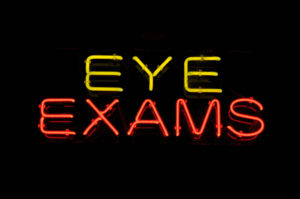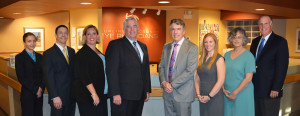Types of Eye Exams


Comprehensive & Routine Eye Exams
Routine eye examinations are comprehensive exams performed on a regular basis. The goal of comprehensive eye exams is to insure that you see well and check for signs of eye disease such as glaucoma, cataracts and others.
We will check your vision and eye pressure. Specialized equipment, including a slit lamp, will used to examine your eyes. Our board certified eye doctors are able to use the slit lamp to examine certain structures in the front of the eye (such as the cornea and eyelids) under magnification as well as inside the eye.
The slit lamp examination can allow us to diagnose dry eye, foreign bodies, eye allergies, etc.
Dilating your pupils will allow us to examine the internal structures of the eye including the retina, macula and optic nerve.
Cataracts are more easily diagnosed with dilated pupils.
Cataract Evaluation
This is similar to a comprehensive eye exam where we specifically address cataracts and any other threats to your vision.
Most patients are referred to us from other doctors to specifically address cataracts and determine if and when cataract surgery may be needed.
Unlike a routine eye examination, we will also take measurements of your cornea, look for evidence of dry eye and measure the length of your eye.
Measuring the curvature of your eye and the length of your eye (called the axial length) allow us to more accurately predict the power of the intraocular lens to use during surgery.
Cataract evaluations may take several hours especially if surgery needs to be scheduled.
Contact Lens and Fitting
Contact lenses can be a great alternative to wearing glasses. Many of our patients prefer contact lenses over glasses.
Contact lens evaluation specifically addresses your questions and concerns about wearing contact lenses. We will also make sure your eyes are healthy enough to wear lenses and check your lenses for proper fit.
Soft lenses, hard contact lenses or gas-permeable offer different advantages to our patients and we will suggest the right lens to meet your needs.
If you are new to contact lenses, we will spend extra time to help you with the proper use and care of the lenses.
When scheduling, please specifically request a contact lens examination.
Refraction
Refraction is a common part of any eye examination.
Refraction measures your need for glasses. Refraction determines the prescription needed to help you see well with glasses or contact lenses.
Changes in refraction allow us to diagnose certain eye conditions such as cataracts.
Check with our appointment desk if your insurance covers basic refraction services.
Laser Vision Correction
This is a consultation designed for our patients interested in LASIK or laser vision correction. We want to thoroughly understand your expectations and educate you about the possible options to meet your needs.
During a LASIK evaluation, we will specifically look for evidence of dry eye, check your refraction and look for evidence of other eye problems.
Please do not wear your contact lenses for at least two weeks before your exam as contact lenses can alter corneal measurements.


